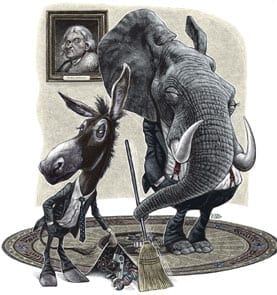
The United States faced down authoritarian governments on the left and right. Now it may be facing an even greater challenge from within.
It is hard to know exactly when it became acceptable for U.S. politicians to be antiscience. For some two centuries science was a preeminent force in American politics, and scientific innovation has been the leading driver of U.S. economic growth since World War II. Kids in the 1960s gathered in school cafeterias to watch moon launches and landings on televisions wheeled in on carts. Breakthroughs in the 1970s and 1980s sparked the computer revolution and a new information economy. Advances in biology, based on evolutionary theory, created the biotech industry. New research in genetics is poised to transform the understanding of disease and the practice of medicine, agriculture and other fields.
The Founding Fathers were science enthusiasts. Thomas Jefferson, a lawyer and scientist, built the primary justification for the nation’s independence on the thinking of Isaac Newton, Francis Bacon and John Locke—the creators of physics, inductive reasoning and empiricism. He called them his “trinity of three greatest men.” If anyone can discover the truth by using reason and science, Jefferson reasoned, then no one is naturally closer to the truth than anyone else. Consequently, those in positions of authority do not have the right to impose their beliefs on other people. The people themselves retain this inalienable right. Based on this foundation of science—of knowledge gained by systematic study and testing instead of by the assertions of ideology—the argument for a new, democratic form of government was self-evident.
Yet despite its history and today’s unprecedented riches from science, the U.S. has begun to slip off of its science foundation. Indeed, in this election cycle, some 236 years after Jefferson penned the Declaration of Independence, several major party contenders for political office took positions that can only be described as “antiscience”: against evolution, human-induced climate change, vaccines, stem cell research, and more. A former Republican governor even warned that his own political party was in danger of becoming “the antiscience party.”
Such positions could typically be dismissed as nothing more than election-year posturing except that they reflect an anti-intellectual conformity that is gaining strength in the U.S. at precisely the moment that most of the important opportunities for economic growth, and serious threats to the well-being of the nation, require a better grasp of scientific issues. By turning public opinion away from the antiauthoritarian principles of the nation’s founders, the new science denialism is creating an existential crisis like few the country has faced before.
via Scientific American – Shawn Lawrence Otto
The Latest Streaming News: Antiscience Beliefs updated minute-by-minute
Bookmark this page and come back often
Latest NEWS
Latest VIDEO







